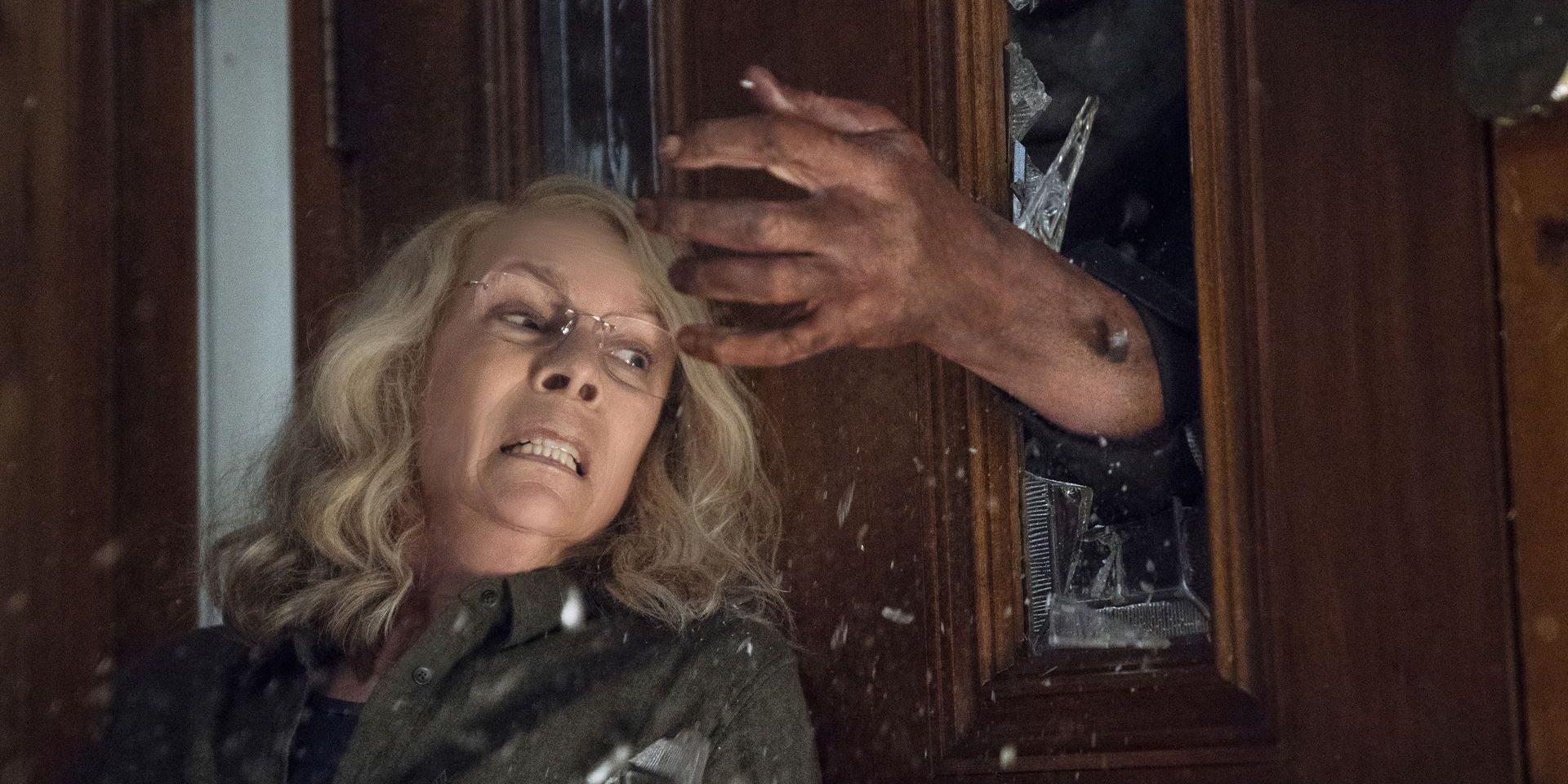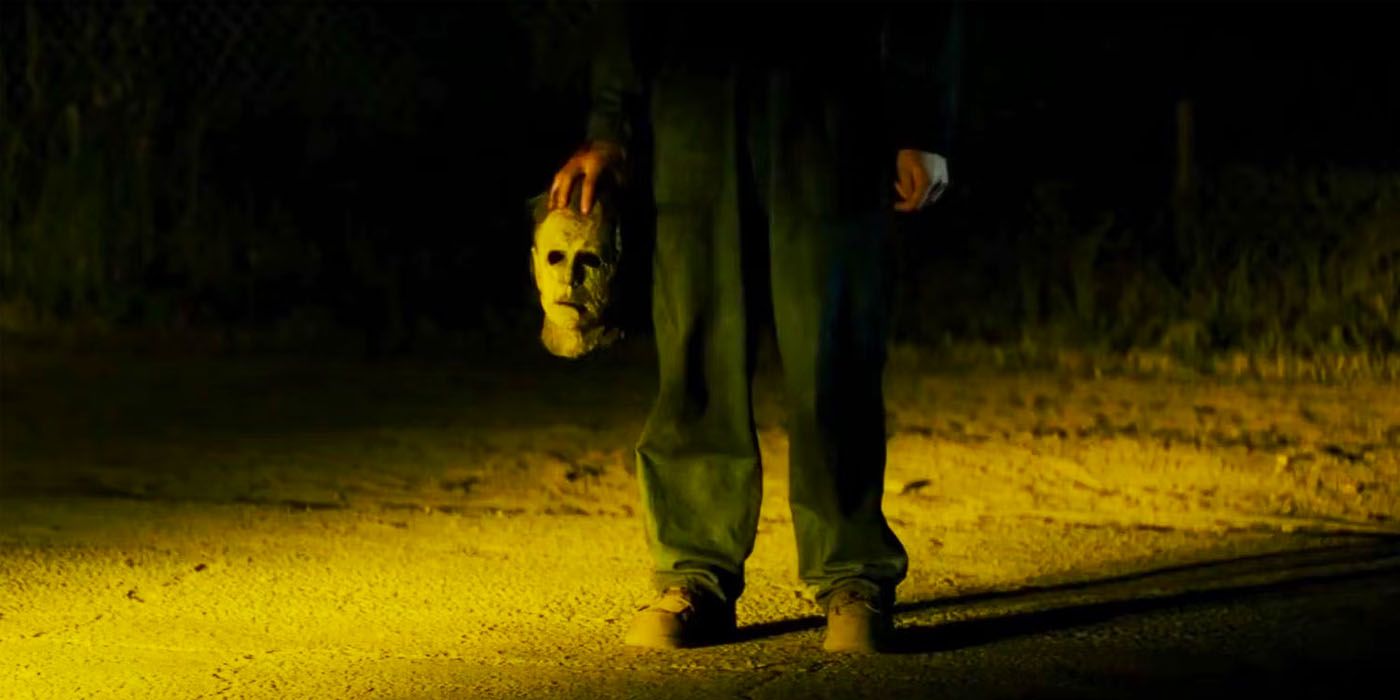David Gordon Green’s 2018 reboot of the Halloween franchise — which kickstarted Michael Myers’ most polarizing run in the series — is now available to stream on Netflix. 2018’s Halloween takes place 40 years after John Carpenter’s groundbreaking 1978 original and ignores every other sequel that came in between. It catches up with a post-traumatic Laurie Strode, who’s now a mother and grandmother and has been nervously awaiting Michael’s return for four decades. While being transferred to a maximum-security prison, Michael escapes and heads back to Haddonfield for another gruesome killing spree on Halloween night.
When it arrived in theaters in 2018, the Halloween reboot was praised as the best Halloween movie since Carpenter’s original. Jamie Lee Curtis’ performance was widely acclaimed and Green’s direction of the tone and atmosphere was similarly lauded. Plus, it became a massive box-office success. But looking back on it now, 2018’s Halloween is best remembered as the beginning of the most controversial era of the franchise. It was a pretty satisfying Halloween revival on its own, but it ended up launching Halloween’s answer to the Star Wars sequel trilogy.
The First Movie In David Gordon Green’s Halloween Trilogy Is Now Streaming On Netflix
2018’s Halloween Started A Trend Of Horror Legacy Sequels
The first installment in Green’s Halloween trilogy, simply titled Halloween, is now streaming on Netflix. 2018’s Halloween combines two of Hollywood’s biggest recent trends: legacy sequels and the horror of trauma. Like Creed, Ghostbusters: Afterlife, and Star Wars: The Force Awakens, it introduces the next generation of heroes following in the previous generation’s footsteps, and uses the events of the previous films as an in-universe metaphor to explore the franchise’s standing in pop culture. And like Smile, The Babadook, and Hereditary, it uses horror tropes and motifs to depict the devastating impact of unresolved trauma.
Why David Gordon Green’s Halloween Movies Are So Divisive
Green’s Halloween Trilogy Overcomplicated The Franchise
The trilogy that followed 2018’s Halloween divided the fan base. For starters, it was questionable whether the Halloween reboot even needed a whole trilogy. The trilogy model is great for franchises like Star Wars, the Marvel Cinematic Universe, and Peter Jackson’s Middle-earth saga, which all tell epic, expansive stories with a massive cast of characters. But Halloween is a franchise that revolves entirely around a notorious serial killer going on various murder sprees in a small town. It doesn’t have the scope or depth of narrative that requires franchises like Star Wars and Marvel to tell their stories in trilogies.
|
Box Office |
RT Critics’ Score |
RT Audience Score |
IMDb Rating |
|
|---|---|---|---|---|
|
Halloween (2018) |
$259.9 million |
79% |
72% |
6.5 |
|
Halloween Kills (2021) |
$133.4 million |
39% |
66% |
5.5 |
|
Halloween Ends (2022) |
$105.4 million |
40% |
58% |
5.0 |
By the time it ended, Green’s Halloween trilogy had seriously run out of steam. The first movie worked fine as a standalone story. It saw Laurie confronting her inner and outer demons 40 years after their initial showdown. This time, she was ready for Michael and ended up trapping him in the basement and burning him alive, literally locking away her trauma and destroying it. That alone could’ve been a satisfying conclusion to the Halloween story, but the producers kept it going for another two movies.
It was an interesting approach to explore the notion of mob justice, but the sequel’s message that everyone else is just as bad as Michael ultimately didn’t land, because it felt disingenuous.
In 2021’s Halloween Kills, Michael effortlessly escapes from the burning basement and the townspeople all come together to kill him once and for all. In theory, it was an interesting approach to explore the notion of mob justice, but the sequel’s message that everyone else is just as bad as Michael ultimately didn’t land, because it felt disingenuous — and it was underwhelming to see a Halloween movie where Laurie spends most of the runtime confined to a hospital bed. Halloween Kills drags out for much longer than it should, and its climactic beatdown disappointingly confirms that Michael is 100% supernatural.
2022’s Halloween Ends set out to be the Avengers: Endgame or the Star Wars: The Rise of Skywalker of the Halloween franchise. But again, this isn’t the kind of franchise that needs a big, epic finale as the culmination of the entire saga. And as long as the Halloween producers were doing an Endgame-style finale, they should’ve focused on Laurie’s longstanding feud with Michael. Instead, Halloween Ends goes off on its own standalone story about a babysitter who’s mistaken for a killer and goes on a dark path. Laurie and Michael’s final showdown is crammed into the last few minutes.
What’s Next For The Halloween Franchise After The Recent Trilogy
Although Halloween Ends Was Conceived As The Final Chapter, There’s A TV Show In The Works
Although Halloween Ends was conceived as the final chapter of the series, the next installment in the Halloween franchise is already in the works. There’s a Halloween TV show in development at Miramax that will serve as a complete creative reset on the franchise. Like Green’s trilogy, the new TV series will ignore all the previous sequels and connect only to the original film. Halloween content is so popular — and so cheap to produce — that, much like Michael, this franchise will probably never die.

